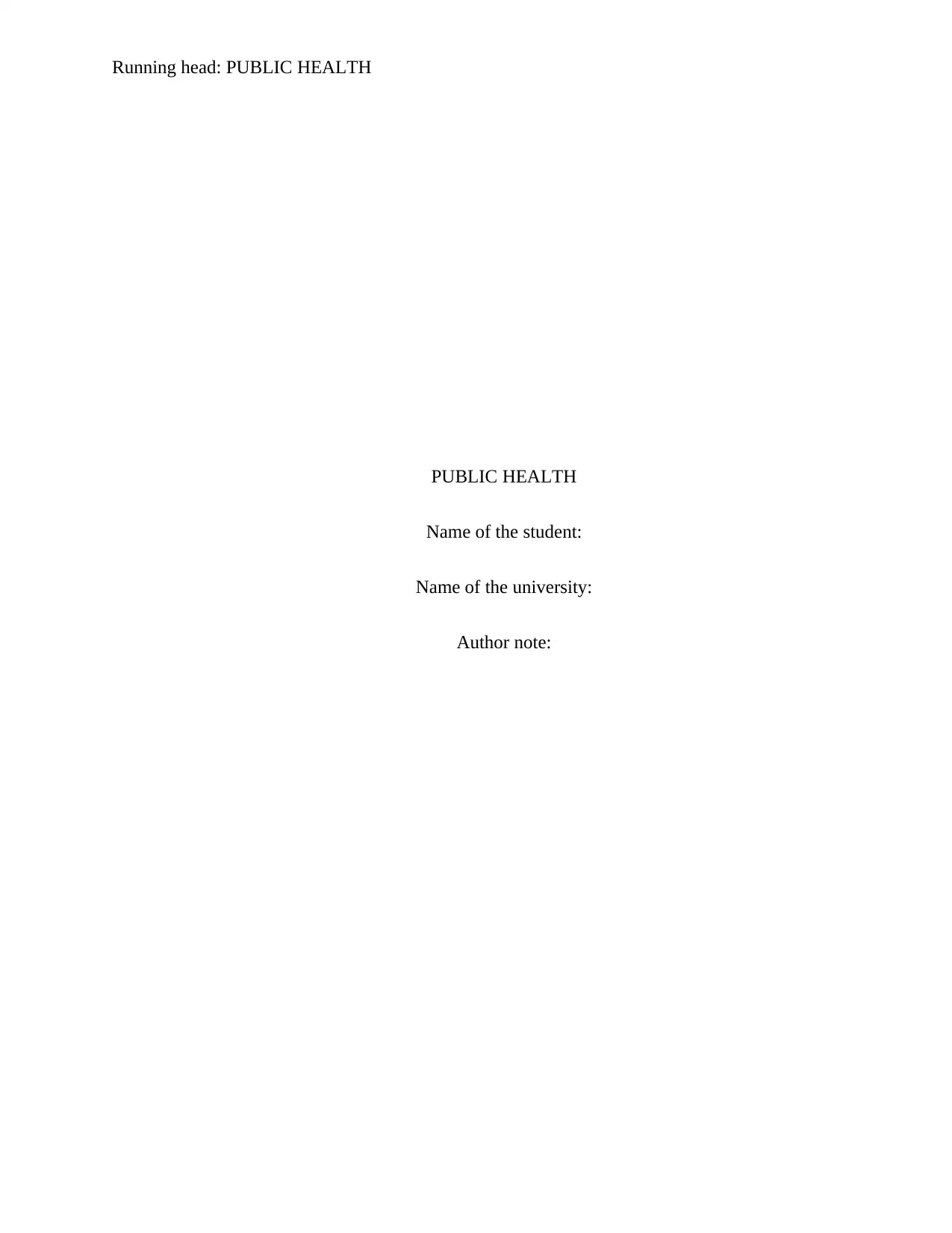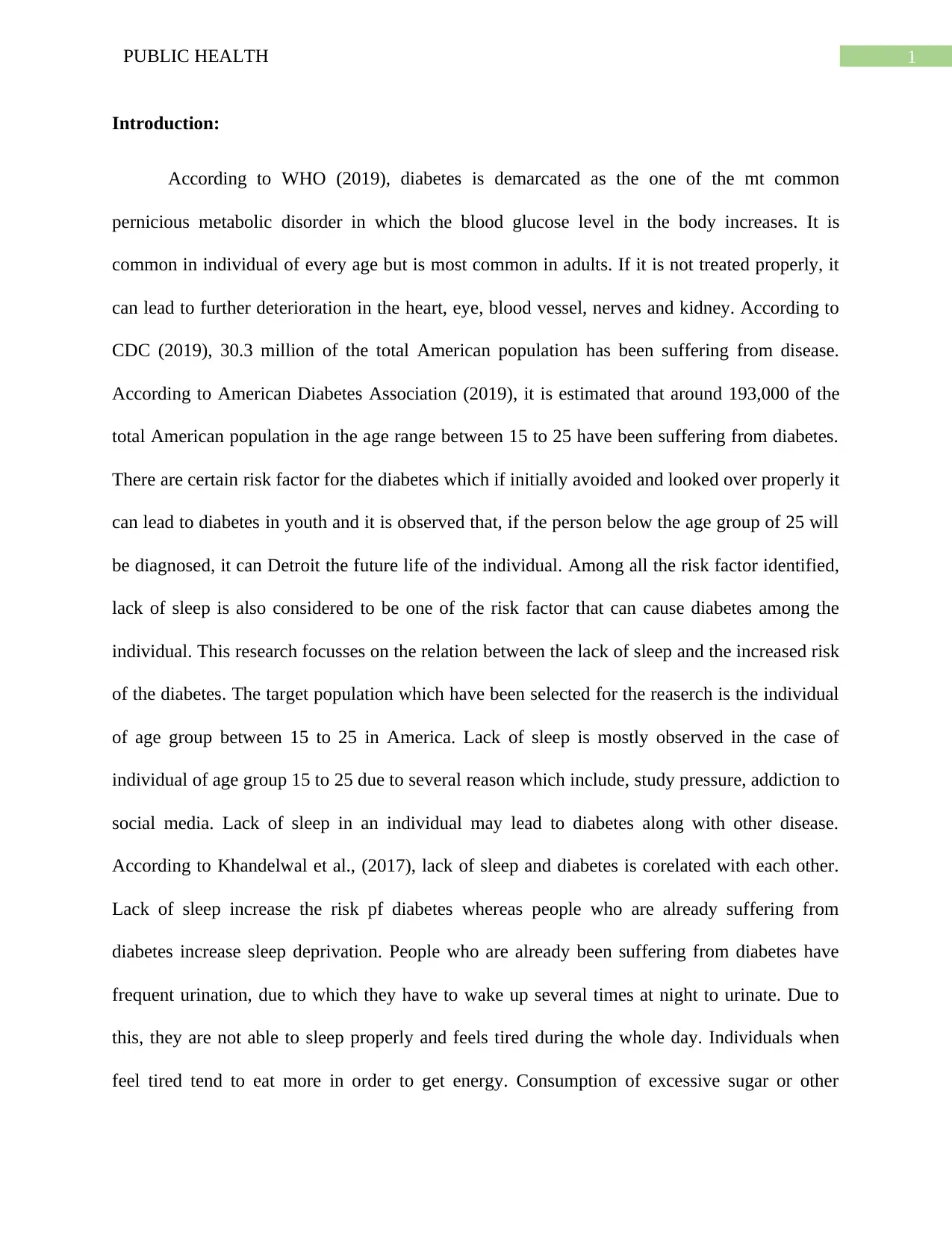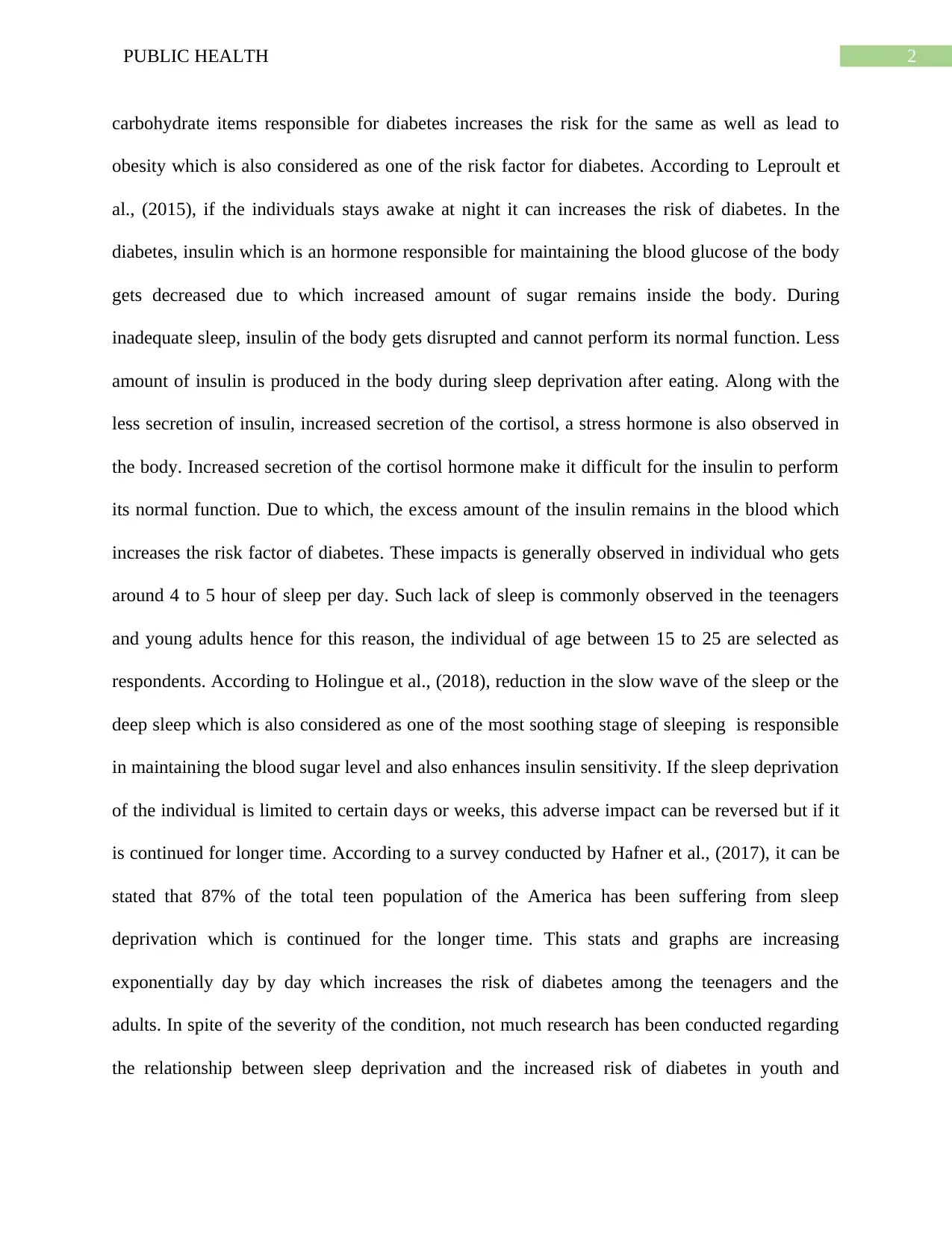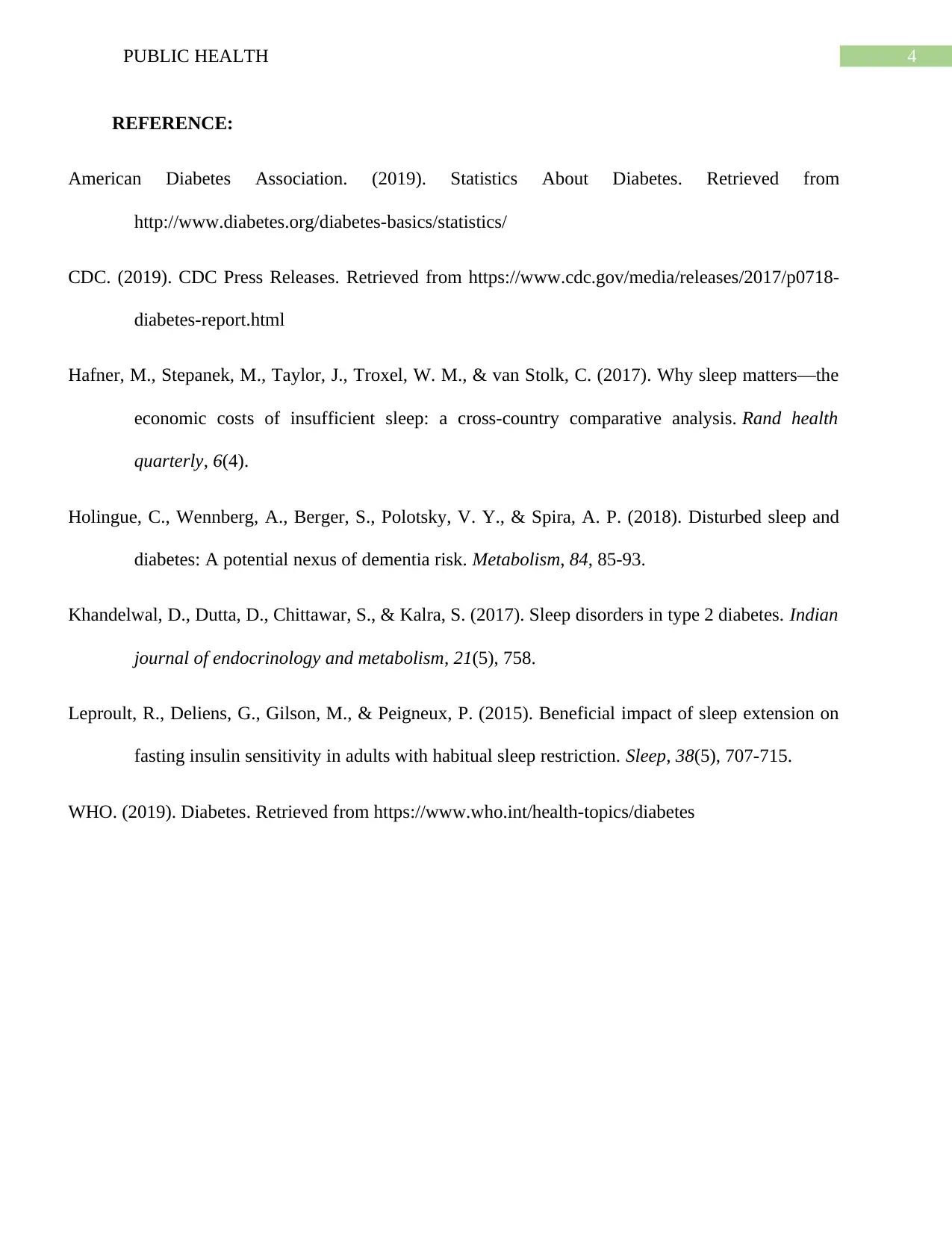The Impact of Sleep Deprivation on Diabetes Risk: A Research Proposal
VerifiedAdded on 2022/12/29
|5
|1084
|73
Report
AI Summary
This report presents an introduction to a research proposal focusing on the relationship between sleep deprivation and the increased risk of type 2 diabetes, particularly among young adults aged 15-25 in America. The problem statement highlights diabetes as a prevalent metabolic disorder, emphasizing the significance of addressing risk factors. The introduction provides statistical evidence from WHO, CDC, and the American Diabetes Association, illustrating the prevalence of diabetes and the potential impact of sleep deprivation. It discusses the physiological mechanisms linking lack of sleep to impaired insulin function, increased cortisol levels, and ultimately, heightened diabetes risk. The proposal underscores the importance of studying this issue, given the rising rates of sleep deprivation among youth and its potential long-term health consequences. The research aims to create awareness and inform interventions targeting this vulnerable population, supported by references to relevant studies and statistics.

Running head: PUBLIC HEALTH
PUBLIC HEALTH
Name of the student:
Name of the university:
Author note:
PUBLIC HEALTH
Name of the student:
Name of the university:
Author note:
Paraphrase This Document
Need a fresh take? Get an instant paraphrase of this document with our AI Paraphraser

1PUBLIC HEALTH
Introduction:
According to WHO (2019), diabetes is demarcated as the one of the mt common
pernicious metabolic disorder in which the blood glucose level in the body increases. It is
common in individual of every age but is most common in adults. If it is not treated properly, it
can lead to further deterioration in the heart, eye, blood vessel, nerves and kidney. According to
CDC (2019), 30.3 million of the total American population has been suffering from disease.
According to American Diabetes Association (2019), it is estimated that around 193,000 of the
total American population in the age range between 15 to 25 have been suffering from diabetes.
There are certain risk factor for the diabetes which if initially avoided and looked over properly it
can lead to diabetes in youth and it is observed that, if the person below the age group of 25 will
be diagnosed, it can Detroit the future life of the individual. Among all the risk factor identified,
lack of sleep is also considered to be one of the risk factor that can cause diabetes among the
individual. This research focusses on the relation between the lack of sleep and the increased risk
of the diabetes. The target population which have been selected for the reaserch is the individual
of age group between 15 to 25 in America. Lack of sleep is mostly observed in the case of
individual of age group 15 to 25 due to several reason which include, study pressure, addiction to
social media. Lack of sleep in an individual may lead to diabetes along with other disease.
According to Khandelwal et al., (2017), lack of sleep and diabetes is corelated with each other.
Lack of sleep increase the risk pf diabetes whereas people who are already suffering from
diabetes increase sleep deprivation. People who are already been suffering from diabetes have
frequent urination, due to which they have to wake up several times at night to urinate. Due to
this, they are not able to sleep properly and feels tired during the whole day. Individuals when
feel tired tend to eat more in order to get energy. Consumption of excessive sugar or other
Introduction:
According to WHO (2019), diabetes is demarcated as the one of the mt common
pernicious metabolic disorder in which the blood glucose level in the body increases. It is
common in individual of every age but is most common in adults. If it is not treated properly, it
can lead to further deterioration in the heart, eye, blood vessel, nerves and kidney. According to
CDC (2019), 30.3 million of the total American population has been suffering from disease.
According to American Diabetes Association (2019), it is estimated that around 193,000 of the
total American population in the age range between 15 to 25 have been suffering from diabetes.
There are certain risk factor for the diabetes which if initially avoided and looked over properly it
can lead to diabetes in youth and it is observed that, if the person below the age group of 25 will
be diagnosed, it can Detroit the future life of the individual. Among all the risk factor identified,
lack of sleep is also considered to be one of the risk factor that can cause diabetes among the
individual. This research focusses on the relation between the lack of sleep and the increased risk
of the diabetes. The target population which have been selected for the reaserch is the individual
of age group between 15 to 25 in America. Lack of sleep is mostly observed in the case of
individual of age group 15 to 25 due to several reason which include, study pressure, addiction to
social media. Lack of sleep in an individual may lead to diabetes along with other disease.
According to Khandelwal et al., (2017), lack of sleep and diabetes is corelated with each other.
Lack of sleep increase the risk pf diabetes whereas people who are already suffering from
diabetes increase sleep deprivation. People who are already been suffering from diabetes have
frequent urination, due to which they have to wake up several times at night to urinate. Due to
this, they are not able to sleep properly and feels tired during the whole day. Individuals when
feel tired tend to eat more in order to get energy. Consumption of excessive sugar or other

2PUBLIC HEALTH
carbohydrate items responsible for diabetes increases the risk for the same as well as lead to
obesity which is also considered as one of the risk factor for diabetes. According to Leproult et
al., (2015), if the individuals stays awake at night it can increases the risk of diabetes. In the
diabetes, insulin which is an hormone responsible for maintaining the blood glucose of the body
gets decreased due to which increased amount of sugar remains inside the body. During
inadequate sleep, insulin of the body gets disrupted and cannot perform its normal function. Less
amount of insulin is produced in the body during sleep deprivation after eating. Along with the
less secretion of insulin, increased secretion of the cortisol, a stress hormone is also observed in
the body. Increased secretion of the cortisol hormone make it difficult for the insulin to perform
its normal function. Due to which, the excess amount of the insulin remains in the blood which
increases the risk factor of diabetes. These impacts is generally observed in individual who gets
around 4 to 5 hour of sleep per day. Such lack of sleep is commonly observed in the teenagers
and young adults hence for this reason, the individual of age between 15 to 25 are selected as
respondents. According to Holingue et al., (2018), reduction in the slow wave of the sleep or the
deep sleep which is also considered as one of the most soothing stage of sleeping is responsible
in maintaining the blood sugar level and also enhances insulin sensitivity. If the sleep deprivation
of the individual is limited to certain days or weeks, this adverse impact can be reversed but if it
is continued for longer time. According to a survey conducted by Hafner et al., (2017), it can be
stated that 87% of the total teen population of the America has been suffering from sleep
deprivation which is continued for the longer time. This stats and graphs are increasing
exponentially day by day which increases the risk of diabetes among the teenagers and the
adults. In spite of the severity of the condition, not much research has been conducted regarding
the relationship between sleep deprivation and the increased risk of diabetes in youth and
carbohydrate items responsible for diabetes increases the risk for the same as well as lead to
obesity which is also considered as one of the risk factor for diabetes. According to Leproult et
al., (2015), if the individuals stays awake at night it can increases the risk of diabetes. In the
diabetes, insulin which is an hormone responsible for maintaining the blood glucose of the body
gets decreased due to which increased amount of sugar remains inside the body. During
inadequate sleep, insulin of the body gets disrupted and cannot perform its normal function. Less
amount of insulin is produced in the body during sleep deprivation after eating. Along with the
less secretion of insulin, increased secretion of the cortisol, a stress hormone is also observed in
the body. Increased secretion of the cortisol hormone make it difficult for the insulin to perform
its normal function. Due to which, the excess amount of the insulin remains in the blood which
increases the risk factor of diabetes. These impacts is generally observed in individual who gets
around 4 to 5 hour of sleep per day. Such lack of sleep is commonly observed in the teenagers
and young adults hence for this reason, the individual of age between 15 to 25 are selected as
respondents. According to Holingue et al., (2018), reduction in the slow wave of the sleep or the
deep sleep which is also considered as one of the most soothing stage of sleeping is responsible
in maintaining the blood sugar level and also enhances insulin sensitivity. If the sleep deprivation
of the individual is limited to certain days or weeks, this adverse impact can be reversed but if it
is continued for longer time. According to a survey conducted by Hafner et al., (2017), it can be
stated that 87% of the total teen population of the America has been suffering from sleep
deprivation which is continued for the longer time. This stats and graphs are increasing
exponentially day by day which increases the risk of diabetes among the teenagers and the
adults. In spite of the severity of the condition, not much research has been conducted regarding
the relationship between sleep deprivation and the increased risk of diabetes in youth and
⊘ This is a preview!⊘
Do you want full access?
Subscribe today to unlock all pages.

Trusted by 1+ million students worldwide

3PUBLIC HEALTH
teenagers. Hence it is very important to conduct the research in order to create awareness among
the individual.
teenagers. Hence it is very important to conduct the research in order to create awareness among
the individual.
Paraphrase This Document
Need a fresh take? Get an instant paraphrase of this document with our AI Paraphraser

4PUBLIC HEALTH
REFERENCE:
American Diabetes Association. (2019). Statistics About Diabetes. Retrieved from
http://www.diabetes.org/diabetes-basics/statistics/
CDC. (2019). CDC Press Releases. Retrieved from https://www.cdc.gov/media/releases/2017/p0718-
diabetes-report.html
Hafner, M., Stepanek, M., Taylor, J., Troxel, W. M., & van Stolk, C. (2017). Why sleep matters—the
economic costs of insufficient sleep: a cross-country comparative analysis. Rand health
quarterly, 6(4).
Holingue, C., Wennberg, A., Berger, S., Polotsky, V. Y., & Spira, A. P. (2018). Disturbed sleep and
diabetes: A potential nexus of dementia risk. Metabolism, 84, 85-93.
Khandelwal, D., Dutta, D., Chittawar, S., & Kalra, S. (2017). Sleep disorders in type 2 diabetes. Indian
journal of endocrinology and metabolism, 21(5), 758.
Leproult, R., Deliens, G., Gilson, M., & Peigneux, P. (2015). Beneficial impact of sleep extension on
fasting insulin sensitivity in adults with habitual sleep restriction. Sleep, 38(5), 707-715.
WHO. (2019). Diabetes. Retrieved from https://www.who.int/health-topics/diabetes
REFERENCE:
American Diabetes Association. (2019). Statistics About Diabetes. Retrieved from
http://www.diabetes.org/diabetes-basics/statistics/
CDC. (2019). CDC Press Releases. Retrieved from https://www.cdc.gov/media/releases/2017/p0718-
diabetes-report.html
Hafner, M., Stepanek, M., Taylor, J., Troxel, W. M., & van Stolk, C. (2017). Why sleep matters—the
economic costs of insufficient sleep: a cross-country comparative analysis. Rand health
quarterly, 6(4).
Holingue, C., Wennberg, A., Berger, S., Polotsky, V. Y., & Spira, A. P. (2018). Disturbed sleep and
diabetes: A potential nexus of dementia risk. Metabolism, 84, 85-93.
Khandelwal, D., Dutta, D., Chittawar, S., & Kalra, S. (2017). Sleep disorders in type 2 diabetes. Indian
journal of endocrinology and metabolism, 21(5), 758.
Leproult, R., Deliens, G., Gilson, M., & Peigneux, P. (2015). Beneficial impact of sleep extension on
fasting insulin sensitivity in adults with habitual sleep restriction. Sleep, 38(5), 707-715.
WHO. (2019). Diabetes. Retrieved from https://www.who.int/health-topics/diabetes
1 out of 5
Related Documents
Your All-in-One AI-Powered Toolkit for Academic Success.
+13062052269
info@desklib.com
Available 24*7 on WhatsApp / Email
![[object Object]](/_next/static/media/star-bottom.7253800d.svg)
Unlock your academic potential
Copyright © 2020–2026 A2Z Services. All Rights Reserved. Developed and managed by ZUCOL.





